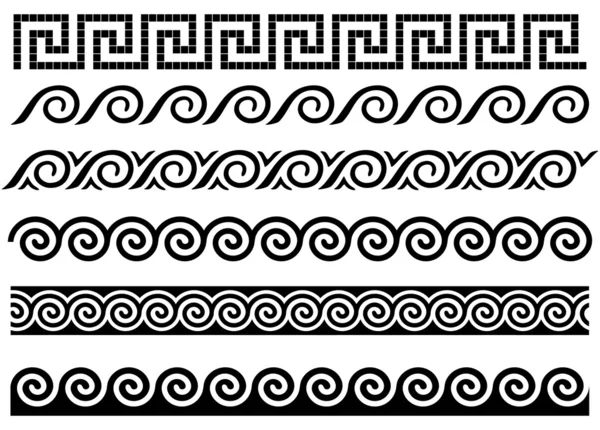

As a result, even in Classical Greece (and in later Greek thought) the name of the river had become a common noun meaning anything convoluted and winding, such as decorative patterns or speech and ideas, as well as the geomorphological feature. The term derives from the winding river Menderes located in Asia-Minor and known to the Ancient Greeks as Μαίανδρος Maiandros ( Latin: Maeander), characterised by a very convoluted path along the lower reach. Streams or rivers with a single channel and sinuosities of 1.5 or more are defined as meandering streams or rivers. The sinuosity of a watercourse is the ratio of the length of the channel to the straight line down-valley distance. The degree of meandering of the channel of a river, stream, or other watercourse is measured by its sinuosity.

Over time, meanders migrate downstream, sometimes in such a short time as to create civil engineering challenges for local municipalities attempting to maintain stable roads and bridges. It typically ranges from 15 to 18 times the width of the channel. The zone within which a meandering stream periodically shifts its channel is known as a meander belt. The result of this coupled erosion and sedimentation is the formation of a sinuous course as the channel migrates back and forth across the axis of a floodplain. It is produced as a watercourse erodes the sediments of an outer, concave bank ( cut bank or river cliff) and deposits sediments on an inner, convex bank which is typically a point bar.
Greek meander series#
Propertius, Elegies - Latin Elegy C1st B.C.Ī complete bibliography of the translations quoted on this page.The Jordan River, near the Dead Sea, 1937Ī meander is one of a series of regular sinuous curves in the channel of a river or other watercourse.Ovid, Metamorphoses - Latin Epic C1st B.C.Hyginus, Fabulae - Latin Mythography C2nd A.D.Nonnus, Dionysiaca - Greek Epic C5th A.D.Pausanias, Description of Greece - Greek Travelogue C2nd A.D.Strabo, Geography - Greek Geography C1st B.C.Hesiod, Theogony - Greek Epic C8th - 7th B.C."His own father called him Kalamos (Calamus) : his father Maiandros (Maeander), lurking in the secret places with his water in the lap of earth-who rolls deep through the earth and drags his crooked stream towards the light, crawling unseen and travelling slantwise underground, until he leaps up quickly and lifts his neck above the ground." "The stream of the Maeandrus (Maeander) wanders deceptively over the Phrygian plain and itself conceals the direction of its flow." Of the same descent Rivers : Strymon, Nile, Euphrates, Tanais, Indus, Cephisus, Ismenus, Axenus, Achelous, Simoeis, Inachus, Alpheus, Thermodon, Scamandrus, Tigris, Maeandrus, Orontes." " built the battlements that keep their founder's name where, as she strolled beside Maeander's winding banks, her father's stream, that turns so often back upon its course, he joined in love a Nympha of beauty rare, Cyanee." "Ankaios (Ancaeus) took to wife Samia, the daughter of the river Maiandros (Maeander)." "And they say that lawsuits are brought against the god Maiandros (Maeander) for altering the boundaries of the countries on his banks, that is, when the projecting elbows of land are swept away by him and that when he is convicted the fines are paid from the tolls collected at the ferries." Strymon and Maiandros (Maeander), Istros (Ister) of the beautiful waters. "Tethys bore to Okeanos (Oceanus) the swirling Potamoi (Rivers). Evelyn-White) (Greek epic C8th or 7th B.C.) : Source: Dictionary of Greek and Roman Biography and Mythology. He was the father of Cyanea and Canaus, who is hence called Maeandrius. MAEANDRUS (Maiandros), a son of Oceanus and Tethys, and the god of the winding river Maeander in Phrygia.

Perhaps SALMAKIS, THE NYMPHAI KARIAI, THE MYKALESSIDES KYANEE (Ovid Metamorphoses 9.446, Nonnus Dionysiaca 11.449) OKEANOS & TETHYS (Hesiod Theogony 339, Hyginus Preface) OFFSPRING The major neighbouring rivers were the Kaystros (Cayster) to the north and the Indos to the south. The River Maiandros had its headwaters the highlands of southern Phrygia and, flowing west through Karia, entered the Aegean Sea opposite the town of Miletos (Miletus). MAIANDROS (Maeander) was a river-god of Karia (Caria) in Anatolia (modern Turkey).


 0 kommentar(er)
0 kommentar(er)
